Prime Minister of Yugoslavia

 Clash Royale CLAN TAG#URR8PPP
Clash Royale CLAN TAG#URR8PPP | Prime Minister of Yugoslavia | |
|---|---|
| Precursor | |
| Formation | 1 December 1918 |
| First holder | Nikola Pašić |
| Final holder | Ante Marković |
| Abolished | 14 July 1992 |
| Succession | |
The Prime Minister of Yugoslavia was the head of government of the Yugoslav state, from the creation of the Kingdom of Serbs, Croats and Slovenes in 1918 until the breakup of the Socialist Federal Republic of Yugoslavia in 1992.
Contents
1 History
1.1 Kingdom of Yugoslavia
1.2 SFR Yugoslavia
2 List
3 See also
4 References
History
Kingdom of Yugoslavia

Standard of the Prime Minister (Kingdom of Yugoslavia)
The Kingdom of Serbs, Croats and Slovenes was created by the unification of the Kingdom of Serbia (the Kingdom of Montenegro had united with Serbia five days previously, while the regions of Kosovo, Vojvodina and Vardar Macedonia were parts of Serbia prior to the unification) and the provisional State of Slovenes, Croats and Serbs (itself formed from territories of the former Austro-Hungarian Empire) on 1 December 1918.
Until 6 January 1929, the Kingdom of Serbs, Croats and Slovenes was a parliamentary monarchy. On that day, King Alexander I abolished the Vidovdan Constitution (adopted in 1921), prorogued the National Assembly and introduced a personal dictatorship (so-called 6 January Dictatorship). He renamed the country Kingdom of Yugoslavia on 3 October 1929, and continued to rule as a de facto absolute monarch until his assassination on 9 October 1934, during a state visit to France. After his assassination, parliamentary monarchy was put back in place.
The Kingdom of Yugoslavia was defeated and occupied after the German invasion on 17 April 1941. The monarchy was formally abolished on 29 November 1945.
In 1945 there were ten living former prime ministers. Out of these, Nikola Uzunović, Dušan Simović, Miloš Trifunović and Ivan Šubašić lived in the Democratic Federal Republic of Yugoslavia while Petar Živković, Bogoljub Jevtić, Milan Stojadinović, Dragiša Cvetković, Slobodan Jovanović and Božidar Purić remained in exile.
SFR Yugoslavia

Standard of the Prime Minister (Federal Yugoslavia)
After the German invasion and fragmentation of the Kingdom of Yugoslavia, the Partisan resistance in occupied Yugoslavia formed a deliberative council, the Anti-Fascist Council of National Liberation of Yugoslavia (AVNOJ) in 1942. On 29 November 1943 the AVNOJ proclaimed the Democratic Federal Yugoslavia, and appointed the National Committee for the Liberation of Yugoslavia (NKOJ), led by Prime Minister Josip Broz Tito, as its government. Josip Broz Tito was quickly recognized by the Allies at the Tehran Conference, and the royalist government-in-exile in London was pressured into agreeing on a merge with the NKOJ. In order to facilitate this, Ivan Šubašić was appointed by the King to head the London government.
For a period, Yugoslavia had two recognized prime ministers and governments (which both agreed to formally merge as soon as possible): Josip Broz Tito leading the NKOJ in occupied Yugoslavia, and Ivan Šubašić leading the King's government-in-exile in London. With the Tito-Šubašić Agreement in 1944, the two prime ministers agreed that the new joint government would be led by Tito. After the liberation of Yugoslavia's capital Belgrade in October 1944, the joint government was officially formed on 2 November 1944, with Josip Broz Tito as the Prime Minister.
After the war, elections were held ending in an overwhelming victory for Tito's People's Front. The new parliament deposed King Peter II on 29 November 1945, and declared a Federal People's Republic of Yugoslavia (in 1963, the state was renamed Socialist Federal Republic of Yugoslavia). The government was first headed by a Prime Minister up to 14 January 1953, when major decentralization reforms reorganized the government into the Federal Executive Council chaired by a President. Josip Broz Tito held the post from 1944 to 1963.
Five out of nine heads of government of Yugoslavia in this period were of Croatian ethnicity. Three were from Croatia itself (Josip Broz Tito, Mika Špiljak, and Milka Planinc), while two were Bosnian Croats (Branko Mikulić and Ante Marković). Ante Marković however, though a Croat from Bosnia and Herzegovina by birth, was a politician of Croatia like Špiljak and Planinc, serving (at different times) as both prime minister and president of the presidency of that federal unit.
List
Yugoslav National Party
People's Radical Party
Yugoslav Radical Union
Croatian Peasant Party
Democratic Party
Slovene People's Party
League of Communists of Yugoslavia
Socialist Party of Serbia
Union of Reform Forces of Yugoslavia
Independent
No. | Head of Government | Lifespan | Ethnicity | Term of office | Party | Note | ||
|---|---|---|---|---|---|---|---|---|
In the Kingdom of Yugoslavia | ||||||||
N/A |  | Nikola Pašić (acting) | 1845–1926 | Serb | 1 December 1918 | 22 December 1918 | People's Radical Party | Acting prime minister, as the last prime minister of Serbia. |
1 |  | Stojan Protić | 1857–1923 | Serb | 22 December 1918 | 16 August 1919 | People's Radical Party | First Prime Minister of the Kingdom of Serbs, Croats and Slovenes (that will be renamed "Kingdom of Yugoslavia"). |
2 |  | Ljubomir Davidović | 1863–1940 | Serb | 16 August 1919 | 19 February 1920 | Democratic Party | |
(1) |  | Stojan Protić | 1857–1923 | Serb | 19 February 1920 | 16 May 1920 | People's Radical Party | |
3 | 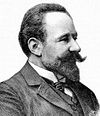 | Milenko Vesnić | 1863–1921 | Serb | 16 May 1920 | 1 January 1921 | People's Radical Party | |
4 |  | Nikola Pašić | 1845–1926 | Serb | 1 January 1921 | 28 July 1924 | People's Radical Party | Second term. Vidovdan Constitution adopted on June 28, 1921. |
(2) |  | Ljubomir Davidović | 1863–1940 | Serb | 28 July 1924 | 6 November 1924 | Democratic Party | Second term |
(4) |  | Nikola Pašić | 1845–1926 | Serb | 6 November 1924 | 8 April 1926 | People's Radical Party | Third term |
5 |  | Nikola Uzunović | 1873–1954 | Serb | 8 April 1926 | 17 April 1927 | People's Radical Party | |
6 |  | Velimir Vukićević | 1871–1930 | Serb | 17 April 1927 | 28 July 1928 | People's Radical Party | Resigned after the assassination attempt on opposition leader Stjepan Radić in the National Assembly. |
7 | 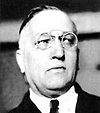 | Anton Korošec | 1872–1940 | Slovene | 28 July 1928 | 7 January 1929 | Slovene People's Party | Appointed after the assassination attempt on Stjepan Radić, until the 6 January Dictatorship. |
8 |  | Petar Živković | 1879–1947 | Serb | 7 January 1929 | 4 April 1932 | Yugoslav Radical Peasants' Democracy | Prime Minister of the first authoritarian government appointed by King Alexander I during the 6 January Dictatorship. Sentenced to death in absentia in 1946. |
9 |  | Vojislav Marinković | 1876–1935 | Serb | 4 April 1932 | 3 July 1932 | Yugoslav Radical Peasants' Democracy | Previously a (founding) member of the Democratic Party. |
10 |  | Milan Srškić | 1880–1937 | Serb | 3 July 1932 | 27 January 1934 | Yugoslav Radical Peasants' Democracy | |
(5) |  | Nikola Uzunović | 1873–1954 | Serb | 27 January 1934 | 22 December 1934 | Yugoslav Radical Peasants' Democracy (renamed) | The Yugoslav Radical Peasants' Democracy party was renamed into the Yugoslav National Party. |
Yugoslav National Party (renamed) | ||||||||
11 |  | Bogoljub Jevtić | 1886–1960 | Serb | 22 December 1934 | 24 June 1935 | Yugoslav National Party (until 1935) | |
Yugoslav Radical Union (from 1935) | ||||||||
12 |  | Milan Stojadinović | 1888–1961 | Serb | 24 June 1935 | 5 February 1939 | Yugoslav Radical Union | |
13 |  | Dragiša Cvetković | 1893–1969 | Serb | 5 February 1939 | 27 March 1941 | Yugoslav Radical Union | Sentenced in absentia in 1945.[1] |
In the Yugoslav government-in-exile | ||||||||
14 |  | Dušan Simović | 1882–1962 | Serb | 27 March 1941 | 12 June 1942 | Independent | Chief of the General Staff of the Royal Yugoslav Army. Took power by military coup d'état. Following the German invasion, he led the government into exile in London. |
15 |  | Slobodan Jovanović | 1869–1958 | Serb | 12 June 1942 | 26 June 1943 | Independent | Headed government-in-exile. Found guilty of treason in absentia in 1946. |
16 |  | Miloš Trifunović | 1871–1957 | Serb | 26 June 1943 | 10 August 1943 | People's Radical Party | Headed government-in-exile. |
17 |  | Božidar Purić | 1891–1977 | Serb | 10 August 1943 | 8 July 1944 | Independent | Headed government-in-exile. Held post simultaneously with Josip Broz Tito. Alternate recognized government (the NKOJ) in existence in occupied Yugoslavia after November 29, 1943. Sentenced in absentia in 1946 |
18 |  | Ivan Šubašić | 1892–1955 | Croat | 8 July 1944 | 2 November 1944 | Croatian Peasant Party | Headed government-in-exile. Held post simultaneously with Josip Broz Tito. Merged into coalition government on November 2, 1944, Josip Broz Tito presiding.[2][3] |
In the Socialist Federal Republic of Yugoslavia | ||||||||
19 (1) | 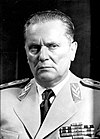 | Josip Broz Tito | 1892–1980 | Croat | 2 November 1944 | 29 June 1963 | Communist Party of Yugoslavia (renamed in 1952) | Held post simultaneously (as head of the NKOJ) first with Božidar Purić, then Ivan Šubašić. Headed joint coalition government. |
League of Communists of Yugoslavia (renamed in 1952) | ||||||||
20 (2) | 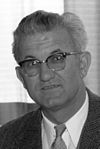 | Petar Stambolić | 1912–2007 | Serb | 29 June 1963 | 16 May 1967 | League of Communists of Yugoslavia | |
21 (3) |  | Mika Špiljak | 1916–2007 | Croat | 16 May 1967 | 18 May 1969 | League of Communists of Yugoslavia | |
22 (4) | 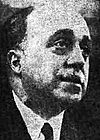 | Mitja Ribičič | 1919–2013 | Slovene | 18 May 1969 | 30 July 1971 | League of Communists of Yugoslavia | |
23 (5) |  | Džemal Bijedić | 1917–1977 | Bosniak | 30 July 1971 | 18 January 1977 | League of Communists of Yugoslavia | Died in office. |
24 (6) | 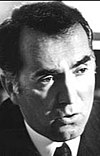 | Veselin Đuranović | 1925–1997 | Montenegrin | 18 January 1977 | 16 May 1982 | League of Communists of Yugoslavia | |
25 (7) |  | Milka Planinc | 1924–2010 | Croat | 16 May 1982 | 15 May 1986 | League of Communists of Yugoslavia | |
26 (8) | 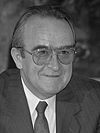 | Branko Mikulić | 1928–1995 | Croat | 15 May 1986 | 16 March 1989 | League of Communists of Yugoslavia | Resigned on 30 December 1988, amid widespread protests. |
27 (9) |  | Ante Marković | 1924–2011 | Croat | 16 March 1989 | 20 December 1991 | League of Communists of Yugoslavia (until January 1990) | Last prime minister of Yugoslavia. The pan-Yugoslav League of Communists of Yugoslavia was dissolved in January 1990, Marković formed his own party, the Union of Reform Forces. |
Union of Reform Forces of Yugoslavia (from January 1990) | ||||||||
N/A |  | Aleksandar Mitrović (acting) | 1933–2012 | Serb | 20 December 1991 | 14 July 1992 | Socialist Party of Serbia | Acting prime minister, installed by Serbia and Montenegro. |
See also
- Deputy Prime Minister of Yugoslavia
- List of heads of state of Yugoslavia
- Chairman of the Council of Ministers of Bosnia and Herzegovina
- Prime Minister of Croatia
- Prime Minister of Serbia and Montenegro
- Prime Minister of the Republic of Macedonia
- Prime Minister of Montenegro
- Prime Minister of Serbia
- Prime Minister of Slovenia
References
^ Rehabilitovan Dragiša Cvetković
^ Lampe, John R.; Yugoslavia as history: twice there was a country; Cambridge University Press, 2000 ISBN 0-521-77401-2
^ Ramet, Sabrina P.; The three Yugoslavias: state-building and legitimation, 1918-2005; Indiana University Press, 2006 ISBN 0-253-34656-8
